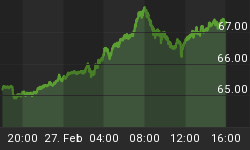This week, Larry Kudlow and others strongly chastised Bernanke for his failure to read the writing on the wall and urged the Fed Chairman to quickly slash the Fed Funds rate. Methinks the pundits doth protest too much. For years, Kudlow, who practically coined the term "Goldilocks economy," has dismissed with scorn suggestions that the American economy was anything less than ragingly healthy. If our economy is really so strong, why does he call so loudly for the artificial stimulus of a significant rate cut?
In truth, the writing has always been clearly on the wall all along. A credit bubble has been steadily inflating for at least the last six years, which in its final frenzy produced some of the most absurd mortgage funding products the world has ever seen. To anyone not dependent on the hysteria, a no-doc, no money down, negative amortization, interest only, adjustable rate jumbo mortgage was a just as clear a sign of pending catastrophe as $200 for a share of Pets.com, or 5,000 Dutch guilders for a single tulip bulb.
The one thing all bubbles have in common is that they eventually pop, and ours just did. Unlike the popping of the last bubble in 2000-2001, this one will fall directly to our economy's bottom line. And this time the Fed can not step up to the plate with unlimited liquidity injections.
A record percentage of our GDP is comprised of consumer spending. The source of this spending was the housing bubble. Would our savings rate really be negative were it not for housing related "wealth?" Could consumers really have spent as much as they did without the benefits of temporarily low teaser rates and the ability to extract equity from their homes? How many service sector jobs are directly related to that extra spending? When the low mortgage payments and home equity disappear, so too will the spending and jobs they engendered.
Those who feel that the economy will keep growing must believe that discretionary consumer spending is unrelated to wealth or expenses. In other words, they believe that individuals will spend as much with no home equity and $3,000 per month mortgage payments as they did with $200,000 in home equity $1,500 monthly payments. Factor in other rising expenses; such as food, energy, insurance, and taxes and discretionary spending will not just slow, it will completely collapse.
With the ugly truth laid bare, many now prod Bernanke and Bush for solutions. Unfortunately there are none. Based on absurd assumptions about real estate, we simply borrowed more money than we can ever hope to pay back. There is no magic elixir we can swallow to cure what ails us. The free market is the only force that can fix this mess. Unfortunately, the fix won't be pretty. Prudent lending standards will return, guaranteeing that real estate prices collapse. This is an important connection that very few have made. There is no way the average American can afford to buy the average house at today's prices with a mortgage he can afford. Assuming that the lax standards of 2005-2006 do not return, the only way this can happen is if real estate prices collapse, which is exactly what is happening.
The financial institutions that are calling most loudly for a bailout claim the Government must act to protect homeowners. However, the most severe losses will not be born by homeowners but by those who loaned them the money. Therefore any bailouts will ultimately go to lenders not borrowers. Homeowners who offered no down payment and who have no equity in their homes will in reality lose nothing in foreclosure, except perhaps a debt burden on an overpriced house. In addition, even those homeowners who made down payments likely extracted larger sums in subsequent refinancings or home equity loans. With plenty of available foreclosed homes on the market to rent it is unlikely that these former homeowners will become homeless.
As a result, the only losses for most homeowners will be psychological, as their dreams of real estate riches vanish. For some paper millionaires, the sudden realization that they are flat broke will be somewhat disheartening. Also for those who thought retirement was simply a function of living in a home and allowing it to appreciate, the sudden realization that they will now have to finance their retirement the old fashioned way, by saving up, will be quite an eye opener. However, even if misguided government bailouts enable more borrowers to keep their homes the equity they thought they had will still be gone.
In the final analysis, though it was Wall Street that served the punch, it was the Greenspan Fed that spiked it in the first place. Just as Fed policy enabled Wall Street to flood the world with worthless dot.com stocks it enabled an encore performance with subprime mortgage-backed securities. My guess is the Fed's bubble blowing days are over. Once the inebriates sober up this time, the hangover will be so severe that no one will drink a drop of Wall Street's punch again, meaning any more inflation the Fed creates will go strait into consumer prices.
For a more in depth analysis of the tenuous position of the American economy, the housing and mortgage markets, and U.S. dollar denominated investments, read my new book "Crash Proof: How to Profit from the Coming Economic Collapse." Click here to order a copy today.
More importantly take action to protect your wealth and preserve your purchasing power before it's too late. Discover the best way to buy gold at www.goldyoucanfold.com, download my free research report on the powerful case for investing in foreign equities available at www.researchreportone.com, and subscribe to my free, on-line investment newsletter at http://www.europac.net/newsletter/newsletter.asp.















